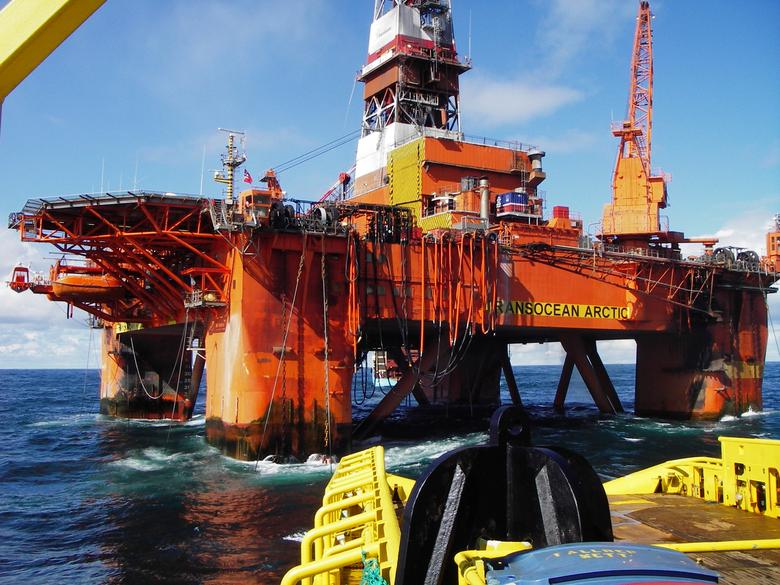
TRANSOCEAN: OIL'S DECLINE: $2.76 BLN

Transocean Ltd. (RIG), owner of the biggest fleet of deep-water drilling rigs, is feeling the effect of an industrywide glut in the expensive vessels just as crude-oil prices tumble.
The company will delay posting third-quarter results after saying earnings would be hit by $2.76 billion in charges from a decline in the value of its contracts-drilling business and a drop in rig-use fees. Shares in the Vernier, Switzerland-based company, which pushed back the release of its earnings report to Monday instead of today, fell 0.7 percent to $29.71 at the close in New York.
Oil's decline to a four-year low in recent months has caused companies to consider spending cuts, which would further reduce demand for rigs and the rates Transocean can charge to lease them to explorers. The drop in prices comes after rig contractors responded to rising demand during the past few years with the biggest batch of construction orders for rigs since the advent of deep-water drilling in the 1970s.
"Ouch," analysts from Tudor Pickering Holt & Co. wrote in a note to investors today. The announcement "reflects the reality of this oversupplied floater rig market globally."
Other rig owners may also face writedowns, Waqar Syed, an analyst at Goldman Sachs Group Inc., wrote today in a note to investors. Among those that may be affected are Diamond Offshore Drilling Inc., Noble Corp., Ensco Plc, Rowan Cos. and Atwood Oceanics Inc., he wrote.
Industrywide Phenomenon
"This is going to be an industrywide phenomenon for the next few years," Syed wrote. "Companies that have spent substantial amounts in the past 10-15 years in upgrading their 1970-1980 vintage rigs may face some writedowns."
Noble regularly does impairment tests on its assets, said John Breed, a company spokesman. "With the current figuration of the Noble fleet, it seems like a major writedown wouldn't be something we would be looking at."
Ensco wrote down the value of some of its rigs in the second quarter. Rowan had no immediate comment.
"Probably right now we do not expect to have to write down more assets in the near future, but obviously we've not done the next quarter review," Marc Edwards, chief executive officer of Diamond Offshore, said on an Oct. 23 conference call.
Mark Mey, chief financial officer at Atwood, said in a phone interview he could see one or two other competitors taking writedowns on their rigs, "but I certainly do believe that we're not in the crosshairs for an impairment charge."
Sell Rigs?
James Tisch, CEO of Loews Corp., the largest shareholder of Diamond Offshore, told analysts Nov. 3 that he wouldn't be surprised "to see some of our competitors get into financial trouble, where they are put into a position, or their lenders are put into a position, that they have to sell rigs."
Rather than trying to sell their older, out-of-work rigs, drillers should simply scrap them, Trey Stolz, an analyst at Iberia Capital Partners LLC in New Orleans, said in a phone interview.
"Rigs need to get retired and taken out of circulation," he said. "You'll see that more and more as rigs come up on their five-year surveys and require massive investments to keep going."
The number of offshore rigs ordered hit a high in August 2013 and there are now 86 floating vessels under construction for delivery through 2020, according to IHS Energy Inc. The total number of contracted floating rigs now is 264.
Icahn Tangle
Barclays Plc cut its 2015 cash-flow forecast for Transocean by 22 percent last month to $2.5 billion, saying the company's "have-it-all" strategy of big dividend payouts to investors amid lower demand for its services was unsustainable.
Transocean is the worst performer on the 15-member Philadelphia Oil Services Index this year, down 40 percent.
The company, which owned the Deepwater Horizon rig that exploded in the Gulf of Mexico in 2010, fought with billionaire investor Carl Icahn, who said it should issue big dividends after it recovered from the oil spill. Transocean bumped its dividend payouts to $1 billion after tangling with Icahn.
Transocean settled some government claims from the Deepwater Horizon for $1.4 billion last year. The shares have fallen 69 percent since the explosion at BP Plc's Macondo well in April 2010.
Bonds Fall
The driller's debt securities were among the worst performers in the $4 trillion Bloomberg U.S. Corporate Bond index in the third quarter as default swaps indicated the biggest deterioration in creditworthiness among peers. Its bonds fell to the lowest since November 2011 today.
Drillers are turning to tax-advantaged master-limited partnerships in an effort to wring out more cash from their more valuable rigs with longer contracts. Seadrill Ltd., the largest offshore rig contractor by market value, and Transocean have done so and Noble said last month it may do the same.
The announcement came a day after Statoil ASA suspended use of Transocean's Spitsbergen rig and another vessel, citing excess capacity.
Average dayrates for ultra-deepwater semi-submersible rigs fell to $339,000 in September, the lowest since 2011, Bloomberg Intelligence reported Oct. 3. The decline from $633,750 in August indicated the market softening faster than expected, Andrew Cosgrove and William Foiles wrote in a note.
Transocean has four ultra-deep drillships in search of work after producers delayed or canceled work because of low crude prices, according to Bloomberg Intelligence. Drillships are mostly used for exploration wells that producers can easily defer because they don't yield immediate revenue. The four ships cost Transocean $1.35 billion, according to Bloomberg Intelligence.
bloomberg.com

